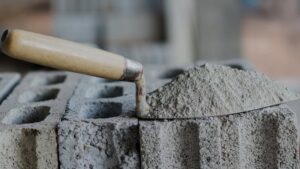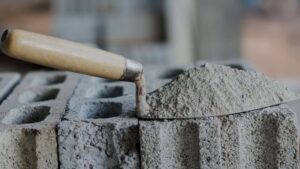
According to the results for January-September 2025, cement producer Mykolaivcement increased its net profit 1.9 times compared to the same period in 2024, to UAH 455.3 million.
According to information on the company’s website, income from ordinary activities for the first nine months of this year increased by 33.7% compared to the same period in 2024 and amounted to UAH 1.9 billion. Gross profit grew by 48.1% and reached UAH 706.3 million.
According to the company, its retained earnings in January-September 2025 decreased by 80.6% to UAH 109.5 million. Current liabilities in the reporting period increased by 56.8% to UAH 7 million, and long-term liabilities by 0.6% to UAH 1.29 billion. The total amount of the company’s assets in January-September decreased by 23.1% to UAH 1.8 billion.
The company reported that in the third quarter, it produced 204.5 thousand tons of products worth UAH 520.4 million. Sales amounted to 210.7 thousand tons worth UAH 835.8 million. Raw materials account for 64% of the production cost structure, electricity for 15.1%, and packaging for 6.8%.
As noted in the report, in the third quarter of 2025, Mykolaivcement’s activities were significantly affected by martial law, exchange rate fluctuations, and the political and economic situation in the country. A decrease in the amount of construction work due to martial law and a decline in the purchasing power of potential customers led to a decrease in demand for products.
In addition, the company reported that the shortage of skilled workers, the slow pace of Ukraine’s economic recovery, and other macroeconomic and geopolitical factors pose significant challenges for the company.
According to the National Securities and Stock Market Commission (NSSMC), as of the first quarter of 2025, the sole shareholder of PJSC Mykolaivcement is the Dutch company CRH Ukraine B.V. (100%).
Mykolaivcement is part of the CEMARK group of cement manufacturers and the CRH group of building materials manufacturers.
CRH is a leading manufacturer of building materials in the world and the largest in North America and Europe. It has 3,200 businesses in 28 countries, employing approximately 71,000 people.
The company also has a presence in Asia. CRH’s American depositary shares are listed on the New York Stock Exchange.

The Experts Club information and analytical center, with the assistance of the Ukrainian Cement Manufacturers Association (Ukrcement), has conducted an analysis of the Ukrainian cement industry.
Over the past five years, the Ukrainian cement industry has experienced a peak in production in 2021, a sharp decline in 2022, a gradual recovery in 2023, and stabilization in 2024. However, the current level is still far from pre-war indicators.
According to trade union and industry reviews, output was about 11 million tons in 2021, fell to 5.4 million tons in 2022, recovered to 7.43 million tons in 2023, and reached 7.93 million tons in 2024. In 2025, manufacturers are talking about an actual “ceiling” — approximately 8 million tons under current risks and logistics, which is likely to be the maximum figure.
The dynamics of domestic cement consumption show a similar trend of “decline and normalization.” In 2021, before the full-scale invasion, consumption was around ~10.6 million tons. In 2022, the cement market fell sharply to approximately 4.5 million tons, rose to 6.2 million tons in 2023, and stabilized at around 6.3 million tons in 2024. Thus, the country approached a stable level of “war” demand, which is almost half of the pre-war level, within the range of 6–6.5 million tons.
The structure of demand has changed: the share of traditional residential and commercial construction has given way to infrastructure and defense projects. The key short-term drivers are fortification works, shelters, emergency repairs of roads and bridges, as well as targeted housing programs such as “єОселя,” which supported demand in 2023–2024, although they did not return it to the 2021 level. The market expects demand to remain stable in 2025, sensitive to the volume of budgetary and international financing.
Amid declining domestic demand, a natural step to support production capacity utilization was the gradual reorientation of part of the cement output to foreign markets. In 2021, cement exports amounted to about 971,000 tons (9% of production), and in 2024, about 1.7 million tons (21.3% of production). The main destinations remain neighboring countries—Poland, Romania, Hungary, and Moldova—as confirmed by both statistical data and industry estimates. The industry has repeatedly emphasized that as soon as domestic consumption begins to grow, the export share will decline in favor of Ukrainian construction sites.
Imports, on the contrary, have declined. After approximately 1 million tons in pre-crisis 2020, deliveries in 2024 decreased to ~40 thousand tons (including niche items such as white cement). This was also influenced by anti-dumping duties: against Turkey — 33–51% (in effect until September 2026), and against Russia/Belarus/Moldova, measures have been extended until 2030. Under the current conditions, when production capacities and logistics are adapted to the “military” level of consumption, demand is fully covered by domestic resources.
The market structure in 2024–2025 is highly concentrated. The key producers are PJSC Ivano-Frankivskcement, the CRH group (after the AMCU approved the deal to acquire CRH’s Dyckerhoff/Buzzi assets — PJSC VIPCEM, Podolsky Cement JSC, Mykolaivcement PJSC, Cement LLC) and Kryvyi Rih Cement PJSC. Despite market discussions, legal disputes, and attention from antitrust authorities—which is to be expected for transactions of this scale—the CRH deal creates potential for integration into global production and logistics chains, attracting new investments, modernizing production, and raising the standards of the competitive environment. In the context of the country’s future large-scale recovery, the agreement opens up opportunities to strengthen supply stability, improve product quality, and develop a competitive environment.
Who is currently driving domestic consumption? In peacetime, the main stabilizers of demand were mass housing construction and infrastructure. In 2023–2025, basic demand will be driven by roads and engineering structures (including fortifications and shelters), municipal and energy facilities, selective reconstruction projects, as well as the private sector — repairs and local construction.
Road construction is an important factor in economic and social development. The introduction of the latest technologies, the use of high-quality materials, and compliance with environmental requirements are key aspects of the successful development of this industry.
The development of the construction and repair of cement concrete roads based on cement mixtures can play a key role in stimulating stable cement consumption in conditions of war and reconstruction. This infrastructure direction makes it possible to maintain the production capacity of enterprises, jobs, and economic activity, despite a significant reduction in residential and commercial construction. Thanks to their durability and endurance, cement concrete pavements are the optimal solution for both military and civilian logistics. The implementation of such projects not only ensures constant demand in the industry, but also the development of related sectors, creating a multiplier effect for the economy even in crisis conditions. This issue will be the focus of a specialised seminar organised by NIRI and the Ukrcement Association on 15-16 October 2025, where the advantages and role of cement concrete solutions in the reconstruction of Ukraine will be discussed (details at ukrcement.com.ua).
In terms of sales channels, the market remains predominantly B2B: most of the cement is purchased by contractors, road and infrastructure companies, large developers, reinforced concrete manufacturers, and concrete plants. The B2C channel (retail chains of building materials, small contractors) continues to play a significant role in repairs and low-rise construction, but in terms of total volume, it is inferior to the project segment. Industry reviews of construction projects and reports on fortification works in 2024–2025 provide further confirmation of the “infrastructure” shift.
The geography of foreign sales shows a stable “corridor” and proximity to the EU. According to trade statistics for 2023, Romania accounted for the largest value of supplies, followed by Poland and Hungary; in 2024, Romania, Poland, and Hungary remained in the lead.
This reflects shortages in the EU border markets and the competitiveness of Ukrainian prices with close logistics.
What limits growth. Military risks and energy infrastructure (in particular, the availability of electricity), regional logistics, as well as regulatory and competitive issues. A large-scale jump in consumption (approximately 12–13 million tons) requires a steady inflow of investment resources for reconstruction of around $35 billion per year — the association considers such a scenario to be technically and operationally realistic. Predictable competition rules and price monitoring are important in the equation so that the “reconstruction” multiplier is not absorbed by costs.
Conclusion by Experts Club. The industry has found a “military balance”: production of about 8 million tons, domestic consumption of ~6.3 million tons, and exports as insurance at the level of 1.5–1.7 million tons. With the scaling up of energy restoration and strengthening programs, a shift from exports to the domestic market is logical. The key to acceleration is stable financing of infrastructure and housing, affordable energy, and maintaining fair competition between major players. In such a scenario, cement remains one of the first materials that quickly transforms the budget into employment and GDP — through concrete, reinforced concrete structures, roads, and fortifications.
Sources: Global Cement (production and consumption; import duties), Interfax-Ukraine/Ukrcement (exports in 2024; estimates of reconstruction needs), OEC (export destinations in 2023), CEMBUREAU (imports, exports, and consumption, in particular the benchmark for 2024), industry and business media regarding the CRH/Dyckerhoff deal and the competitive situation.
Source: https://expertsclub.eu/rynok-czementu-ukrayiny-doslidzhennya-experts-club/

Domestic cement and concrete producers are able to increase their capacity to meet the needs of recovery in any scenario, according to a survey of cement producers and consumers conducted by CBR last year.
“The study showed that even in a situation of high uncertainty, as it is now, with reduced international financing and extremely limited resources of the Ukrainian budget, cement producers and consumers are ready to quickly restore and expand capacity, ready to invest to meet the recovery demand,” said CBR researcher Tatiana Sytnyk at a meeting of the Confederation of Builders of Ukraine during the presentation of the results.
Cement production has partially recovered since 2023, but consumption is heavily dependent on government funding
According to the CBR study, in 2022, cement production fell significantly due to a decline in domestic consumption – to 5.4 million tons compared to 11 million tons in 2021. However, in 2023-2024, production stabilized, reaching 7.4 million tons and 7.97 million tons respectively. Moreover, according to the interviewed experts, the volume of 8 million tons was the maximum value during the war. After the war is over and the recovery begins, peak cement production can reach a maximum of 12 million tons, but the industry will reach this level in the third or fourth year of recovery.
The main question being discussed by the professional community is whether there will be enough cement to meet the challenges of recovery. It was made more acute by a study conducted in 2022 by the State Foreign Expertise Service, which was based on an optimistic scenario that assumed that there would be enough money for the recovery and that the entire process would take three years, said Pavlo Kachur, chairman of Ukrcement.
“Such calculations assumed a shortage of construction materials, particularly cement. But now the trade union community is assessing the challenges for the industry, taking into account the experience of three years of war and predicting that the recovery will begin primarily with demining, strengthening the demarcation line, and restoring energy facilities. We will start large-scale construction in about the third or fourth year,” he commented to Interfax-Ukraine.
Currently, cement plants are unevenly utilized: facilities in western Ukraine have better utilization, while those in the south and east have worse utilization. In 2022, cement plants operated at a loss, with production not covering fixed costs, but the companies retained their staff. In 2023, they reached break-even operations, as production allowed them to cover fixed costs.
As for cement consumers, the study surveyed producers of concrete, aerated concrete and other building materials representing businesses of various sizes, from small to large businesses, from all regions.
“The study showed that our cement is quite acceptable for producers in terms of quality and even price. It rose in price by 20% in 2023 and by 10% in 2024, in line with inflation,” Kachur said.
Two-thirds of the surveyed cement consumers reported that they increased production in 2023, 20% returned to the pre-war production volume, and there were even those who exceeded it (concrete for infrastructure facilities). However, a year later, in 2024, when the survey was conducted, the mood of cement consumers was rather restrained: they identified the risks of a reduction due to the instability of government funding.
The industry is ready to invest in modernization
According to Kachur, in general, the market experienced a slight decline in cement consumption in 2023, as large-scale protection and restoration projects depend on government funding, and civilian developers are not ready to resume full activity at this stage. Thus, residential and commercial real estate projects have significantly decreased compared to pre-war levels. The expert also called the issue of human resources critical for the industry. New specialists need to be trained to replace mobilized and relocated industry employees.
“This (training, design, and fundraising) will take some time, which will be enough for cement producers to fill the market. First of all, to invest in modernization and expansion. In particular, there are already two ready-made projects for the construction of new kilns to meet the highest modern requirements in Kryvyi Rih and Ivano-Frankivsk and the resource of the Baltsem plant (before the war, it produced about 200 thousand tons of cement with a capacity of 4 million tons),” he said.
The study notes that it is unlikely that completely new plants will be built, but a year is enough to modernize the kiln. It is estimated that at least two plants will launch additional furnaces, which will produce 2 million tons. For example, Kryvyi Rih Cement has already received a special permit to develop the Maryansky limestone deposit (60 km from the plant) and has a plan to build a kiln in the quarry itself to produce clinker. Modernization of the Kramatorsk-based Garmata (nationalized) and Balakliya (Baltsem) plants is also possible.
“Cement companies are ready to make rapid investments in modernization and launch additional kilns when the recovery begins to be the first to respond to the market. The companies are waiting for signals to start the expansion. This could be news about the allocation of funds for recovery and/or demand reaching the level of 9.5 million tons,” explained Sytnyk.
Domestic cement competes on equal terms with European cement
Among the reserves for the critical high demand for recovery, experts also mention the possible return of cement imports to Ukraine. Currently, Ukraine does not import but exports this product.
“We must honestly admit that during the war, exports actually save our industry. Before the war, in 2021, total cement exports amounted to about 56 thousand tons, and in 2024 – 1.7 million tons, which is about 15% of what we produce, which is a large share. We are constantly telling our neighbors: “As soon as Ukrainian consumption picks up, the situation will change dramatically, it will be more profitable for us to transport cement to construction sites in Ukraine, and the issue of imports will become relevant,” Kachur says.
The CBR study states that if reconstruction projects are mainly funded by the EU, there is a high probability of an increase in cement imports from Europe, primarily for infrastructure projects.
The expert recalled the possible risks for the industry at this stage, as there is an overproduction of cement in the world today. Therefore, most developed countries can fully cover all the needs of recovery projects, which can harm domestic producers.
“I want to voice my position publicly: the market (at the recovery stage) of Ukraine should be localized as much as possible with domestic products and available only to countries that supported us during the war. Because we have to apply strict measures to countries that support the aggressor country during the war but want to join the recovery to protect their market,” Kachur emphasized.

The Interdepartmental Commission on International Trade (ICIT) will review anti-dumping measures against imports of cement from Russia, Belarus and Moldova to Ukraine due to their expiration.
According to a report in the Uryadovy Courier dated May 22, 2024, the anti-dumping duties previously in force by the decision of the ICIT dated May 21, 2019, are extended for the duration of the review procedure.
It is noted that the Commission considered the relevant request for review from PrJSC “Dickergoff Cement Ukraine”, PrJSC “Ivano-Frankivsk Cement” with the support of PrJSC “Kryvyi Rih Cement”, and also studied the report of the Ministry of Economy on the results of the anti-dumping procedure for the review of customs duties due to the expiration of their validity.
“The request contains sufficient evidence that the termination of anti-dumping measures against imports into Ukraine of cement originating in the Russian Federation, the Republic of Belarus and the Republic of Moldova, applied by the Commission’s decision of 21 May 2019, is likely to lead to the resumption of dumping and injury,” the ICIT said in a statement.
The Ministry of Economy has been entrusted with the review of anti-dumping measures. Stakeholders are to register within 30 days.
According to Alyona Omelchenko, Partner and Head of International Trade Practice at Ilyashev & Partners Law Firm, who represented the interests of Ukrainian cement producers, the review process may take up to one year.
“This decision of the Commission is extremely important for the work of Ukrainian enterprises. The initiation of the review of anti-dumping measures by the ICIT will extend the period of application of duties and prevent dumped imports from entering the market until the final decision is made,” Omelchenko said in a press release.
As reported, in 2019, the ICIT applied anti-dumping duties on imports of cement clinkers and Portland cement to Ukraine under codes 2523 10 and 2523 29 at the level of 57.03% for cement from Belarus; 94.46% for cement from Moldova; 114.95% for cement from Russia. The duties were set for a period of five years.

Cement consumption in the domestic Ukrainian market in 2023, which increased by 17% compared to 2022 and reached 5.4 million tons, will continue to grow moderately, according to Pavlo Kachur, chairman of the Ukrcement Association.
“Even in a state of war, we have undergone some adaptation. If 2022 was a shock year, and our cement consumption dropped to 4.6 million tons of cement per year against 10.5 million tons the previous year, in 2023 we adapted to the situation and reached 5.4 million tons. I think this is a good growth for wartime. I don’t think there will be such a jump in 2024, but we will probably reach 6 million tons of domestic cement consumption,” Kachur said at the roundtable discussion “Building Materials. Preparedness for Market Needs for Recovery” at Interfax-Ukraine on Tuesday.
In addition, at the end of 2023, exports amounted to 1.24 million tons of cement, while imports amounted to 23 thousand tons of special cements that are not produced in the country.
According to Kachur, the potential for cement production by enterprises in Ukraine today is 13.6 million tons of cement, while current financial and human resources provide for consumption of 12.5 million tons. Despite the ability of Ukrainian companies to fully cover the market’s needs, it makes sense to plan to expand production, he said.
“We are also preparing for other options. Processes may overlap, and one of them may be the negotiation process with the European Union. If it is successful, European infrastructure projects may also take place during the recovery period. This may lead to increased cement consumption, and we must be prepared for this,” said the head of Ukrcement.
The expert noted that production could be increased in three stages: the construction of new clinker kilns and capacity expansion, the restoration of plants in Balakliya and Kramatorsk, and the construction of new cement plants. The two companies are already considering the construction of two new clinker kilns, which will increase their cement production capacity by 2.4 million tons, but the construction will be launched after they reach the consumption level of 10.5 million tons of cement.
Kachur also emphasized the importance of localizing production in the recovery prospects and protecting the Ukrainian market.
“I support the thesis of maximum localization. This is the only way for Ukraine’s economy to develop. But it is also important to protect our market. We realize that the countries that are donors of funds for the recovery can also supply construction materials. However, I believe that we should have a separate policy for countries that are not on the side of supporting Ukraine today, during the war. We need to think about how to treat them if, after the war, they want to participate in the reconstruction with their materials. I think it would be unfair if they get the opportunity to make money on the Ukrainian market,” he said.
The Ukrcement Association was established in January 2004 through the reorganization of the Ukrainian Concern of Cement Industry Enterprises and Organizations Ukrcement.